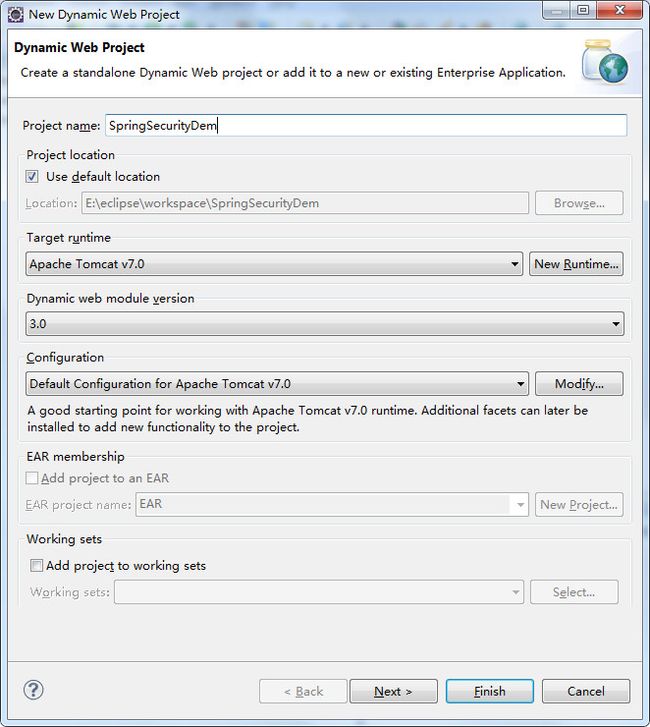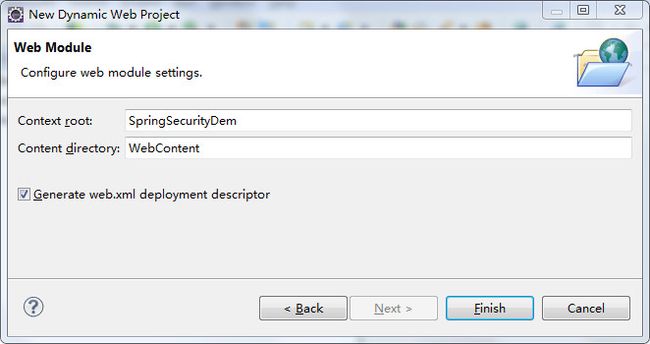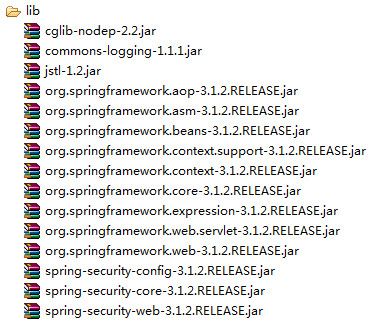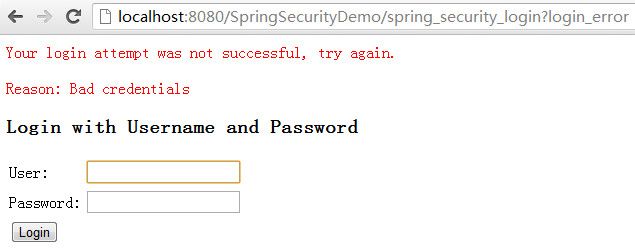基于注释的Spring Security实战指南
分享一下我老师大神的人工智能教程!零基础,通俗易懂!http://blog.csdn.net/jiangjunshow
也欢迎大家转载本篇文章。分享知识,造福人民,实现我们中华民族伟大复兴!
《基于注释的Spring Security实战指南》
版权声明:本文属于原创,版权归作者chszs所有,使用源码无任何限制,但转载文章需经作者同意。
一、准备工作
预准备的工具及软件有:
1. Eclipse IDE:我使用Eclipse JEE 3.7版,即eclipse-jee-indigo-SR2-win32-x86_64.zip
2. JDK 7:我使用JDK 7u4版,即jdk-7u4-windows-x64.exe
3. Spring Framework:我使用Spring Framework 3.1.2版,即spring-framework-3.1.2.RELEASE-with-docs.zip
4. Spring Security:我使用Spring Security 3.1.2版,即spring-security-3.1.2.RELEASE-dist
5. 其它JAR包:jstl-1.2.jar,commons-logging-1.1.1.jar,cglib-nodep-2.2.jar
6. Tomcat应用服务器:我使用Tomcat 7.0.29版,即apache-tomcat-7.0.29-windows-x64.zip
说明:
1. Eclipse IDE和JDK 7的版本可以更高一些,不影响开发和调试。
2. Eclipse一定要下载JEE版。
3. Eclipse、JDK和Tomcat的安装过程省略。
4. 我的操作系统是64位版本,故开发环境对应的工具都是下载64位的安装包。
二、新建项目
在Eclipse环境下新建Dynamic Web Project。
项目名为:SpringSecurityDemo,
Target runtime选择New Runtime,然后选择Apache Tomcat v7.0,并设置好Tomcat的安装目录。
连续点击两次Next,在“Generate web.xml deployment descriptor”处打勾选择,并点击Finish。
三、添加库文件
把下列JAR文件添加到项目的WebContent\WEB-INF\lib目录下。
四、业务层开发
1. 在项目src处,新建com.ch.configuration包,并新建WebConfig.java类,内容如下:
package com.ch.configuration;import org.springframework.context.annotation.Bean;import org.springframework.context.annotation.ComponentScan;import org.springframework.context.annotation.Configuration;import org.springframework.context.annotation.ImportResource;import org.springframework.web.servlet.ViewResolver;import org.springframework.web.servlet.config.annotation.EnableWebMvc;import org.springframework.web.servlet.config.annotation.WebMvcConfigurerAdapter;import org.springframework.web.servlet.view.InternalResourceViewResolver;@EnableWebMvc@Configuration@ComponentScan(basePackages = "com.jverstry")@ImportResource("/WEB-INF/MyServlet-security.xml")public class WebConfig extends WebMvcConfigurerAdapter { @Bean public ViewResolver getViewResolver() { InternalResourceViewResolver resolver = new InternalResourceViewResolver(); resolver.setPrefix("WEB-INF/pages/"); resolver.setSuffix(".jsp"); return resolver; }}2. 新建com.ch.configuration.controller包,并新建MyController.java类,内容如下:
package com.ch.configuration.controller;import com.ch.configuration.service.MyService;import org.springframework.beans.factory.annotation.Autowired;import org.springframework.stereotype.Controller;import org.springframework.ui.Model;import org.springframework.web.bind.annotation.RequestMapping;@Controllerpublic class MyController { private MyService myService; @Autowired public void setMyService(MyService myService) { this.myService = myService; } @RequestMapping(value = "/") public String home() { return "index"; } @RequestMapping(value = "/getTime") public String helloWorld(Model model) { model.addAttribute("TimeIs", myService.getCurrentTimeInMilliseconds()); return "getTime"; }}3. 新建com.ch.configuration.service包,并新建MyService.java接口类,内容如下:
package com.ch.configuration.service;public interface MyService { long getCurrentTimeInMilliseconds();}4. 在com.ch.configuration.service包新建MyServiceImpl.java类,内容如下:
package com.ch.configuration.service;public class MyServiceImpl implements MyService { @Override public long getCurrentTimeInMilliseconds() { return System.currentTimeMillis(); }}5. 在com.ch.configuration.service包新建MyServicesConfiguration.java类,内容如下:
package com.ch.configuration.service;import org.springframework.context.annotation.Bean;import org.springframework.context.annotation.Configuration;@Configurationpublic class MyServicesConfiguration { private MyService myService = new MyServiceImpl(); @Bean public MyService getMyService() { return myService; }}五、前台页面层开发
1. 在WebContent\WEB-INF目录新建pages文件夹,接着在pages目录下新建getTime.jsp文件,内容如下:
<%@ page language="java" contentType="text/html; charset=UTF-8" pageEncoding="UTF-8"%><%@ taglib prefix="c" uri="http://java.sun.com/jsp/jstl/core" %><html><head><meta http-equiv="Content-Type" content="text/html; charset=UTF-8"><title>Get Time !!!title>head><body> The time in milliseconds is: <c:out value="${TimeIs}" /> !body>html>2. 在pages目录下新建index.jsp文件,内容如下:
<%@ page language="java" contentType="text/html; charset=UTF-8" pageEncoding="UTF-8"%><html><head><meta http-equiv="Content-Type" content="text/html; charset=UTF-8"><title>Welcome !!!title>head><body> <h1>Welcome To Spring MVC With Annotations !!!h1> <h1>(with login...)h1>body>html>3. 修改WEB-INF下的web.xml文件,内容如下:
xml version="1.0" encoding="UTF-8"?><web-app xmlns:xsi="http://www.w3.org/2001/XMLSchema-instance" xmlns="http://java.sun.com/xml/ns/javaee" xmlns:web="http://java.sun.com/xml/ns/javaee/web-app_2_5.xsd" xsi:schemaLocation="http://java.sun.com/xml/ns/javaee http://java.sun.com/xml/ns/javaee/web-app_3_0.xsd" id="WebApp_ID" version="3.0"> <display-name>SpringSecurityDemodisplay-name> <context-param> <param-name>contextClassparam-name> <param-value>org.springframework.web.context.support.AnnotationConfigWebApplicationContextparam-value> context-param> <context-param> <param-name>contextConfigLocationparam-name> <param-value>com.ch.configurationparam-value> context-param> <filter> <filter-name>springSecurityFilterChainfilter-name> <filter-class>org.springframework.web.filter.DelegatingFilterProxyfilter-class> filter> <filter-mapping> <filter-name>springSecurityFilterChainfilter-name> <url-pattern>/*url-pattern> filter-mapping> <listener> <listener-class>org.springframework.web.context.ContextLoaderListenerlistener-class> listener> <servlet> <servlet-name>MyServletservlet-name> <servlet-class>org.springframework.web.servlet.DispatcherServletservlet-class> <init-param> <param-name>contextConfigLocationparam-name> <param-value>param-value> init-param> <load-on-startup>1load-on-startup> servlet> <servlet-mapping> <servlet-name>MyServletservlet-name> <url-pattern>/url-pattern> servlet-mapping> <welcome-file-list> <welcome-file>welcome-file> welcome-file-list>web-app>4. 在WEB-INF下新建MyServlet-security.xml文件,内容如下:
<beans:beans xmlns="http://www.springframework.org/schema/security" xmlns:beans="http://www.springframework.org/schema/beans" xmlns:xsi="http://www.w3.org/2001/XMLSchema-instance" xsi:schemaLocation="http://www.springframework.org/schema/beans http://www.springframework.org/schema/beans/spring-beans-3.0.xsd http://www.springframework.org/schema/security http://www.springframework.org/schema/security/spring-security-3.1.xsd"> <http auto-config="true"> <intercept-url pattern="/*" access="ROLE_USER" /> http> <authentication-manager alias="authenticationManager"> <authentication-provider> <user-service> <user authorities="ROLE_USER" name="guest" password="guest" /> user-service> authentication-provider> authentication-manager>beans:beans>至此,Demo项目的开发已经完成。项目的整体结构图如图所示:
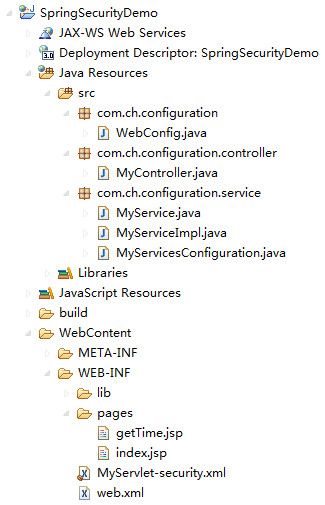
六、部署和运行
1. 在Eclipse选择项目SpringSecurityDemo,右键选择“Run As”,再选择“Run on Server”,选择Apache Tomcat v7.0,Eclipse IDE自动完成部署并运行。
在浏览器上输入地址:http://localhost:8080/SpringSecurityDemo/
显示如下:
注:地址自动被重定向到http://localhost:8080/SpringSecurityDemo/spring_security_login
User/Password输入guest/guest,显示:
如果输入错误,显示:
OK!本文就到这里,对于Spring的注释,可以参考官方文档加以理解。
